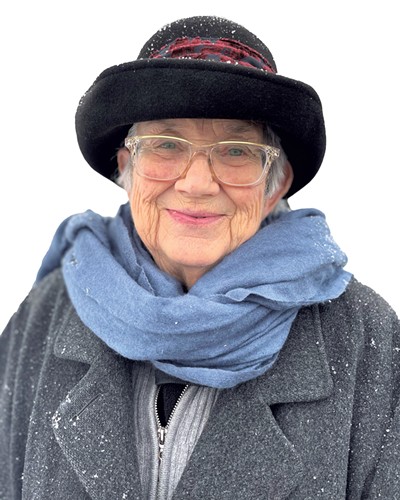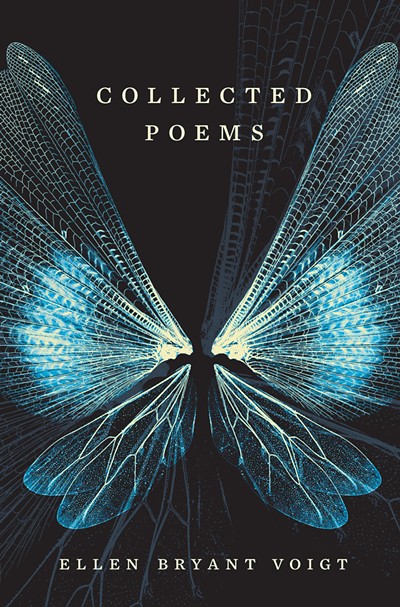
- Courtesy Of Dudley Voigt
- Ellen Bryant Voigt
In 1999, when Ellen Bryant Voigt was chosen for a four-year term as Vermont state poet (now called poet laureate), she initiated a special project. With support from the Lila Wallace-Reader's Digest Fund, she created a three-year, statewide program called the Poet Next Door to bring nine contemporary Vermont writers into high school classrooms for conversations about their art, in person or via interactive TV. (Full disclosure: I was one of the participating writers.) Voigt knew that many students believed poets could be found only in books. She hoped to show them that, in Vermont, poets could be right in your neighborhood, no matter how small a town you lived in.
Voigt, now 80, is the author of nine poetry collections, including Messenger: New and Selected Poems 1976-2006 (2007), finalist for the National Book Award and the Pulitzer Prize; and Kyrie: Poems (1995), finalist for the National Book Critics Circle Award. All the poems from her previous volumes have now been gathered into Collected Poems, published in the spring.
In 2015, Voigt received a MacArthur Fellowship — aka a "Genius Grant." Her other honors include the Arts and Letters Award in Literature from the American Academy of Arts and Letters; the Folger Shakespeare Library's O.B. Hardison Jr. Poetry Prize; and fellowships and grants from the National Endowment for the Arts, the Guggenheim Foundation and the Academy of American Poets. An influential teacher and a teacher of teachers, she founded the world's first low-residency MFA program for writers at Goddard College in Plainfield.
All that worldly acclaim notwithstanding, she herself is a "poet next door."
I interviewed Voigt in the house near the village of Cabot where she has lived for half a century. Visiting is like stepping into the setting of dozens of her poems.
Here is "the apple tree, first / to shatter its petals onto the clipped grass, // or the slovenly heads of the russet peonies // or even that late-to-arrive pastel, / all stalk / with a few staggered blossoms, meadow-rue..." ("Autumn in the Yard We Planted"). Here is her Bechstein grand piano, with "hammers of walnut — nussbaum, 'nut tree'; / the pinblock, hard-grained beech; // the keyframe, oak; the keybed, pine; / the knuckles, rosewood. In the belly, to ripen the tone, / maple, mahogany, and ironwood..." ("Rubato").
For five decades, at home in this very specific place, the poet has written about the astounding adventure of being a human in a body, a member of a family and a thoughtful, wide-awake citizen of small-town America.
Voigt grew up on a farmstead in Chatham, Va., and she has retained her southern Appalachian inflection, honeyed but sharpened with ginger.
In "The Farmer," a poem about her father, she describes the continuous toil:
cattle and pigs; chickens for awhile; a drayhorse,
saddlehorses he was paid to pasture—
an endless stupid round
of animals, one of them always hungry, sick, lost,
calving or farrowing, or waiting slaughter.
As a child, she realized that her music-loving parents, whose own work was never done, would give her a reprieve from chores as long as they heard the sound of her practicing. As she wrote in "At the Piano":
At the piano, the girl, as if rowing upstream,
is driving triplets against the duple meter,
one hand for repetition,
one hand for variation and for song.
She knows nothing, but Bach knows everything.
After high school, Voigt studied music at Converse College (now Converse University) in Spartanburg, S.C., expecting to become a music instructor and band director. She said she had always pictured herself as a teacher, as all the women in her family had been. Yet the strict discipline of classical music came to feel constraining.
One summer during college, Voigt had a job accompanying singing waiters and waitresses at a restaurant in North Carolina. Her roommate, who was constantly reading, introduced her to the poems of John Keats, William Butler Yeats, Rainer Maria Rilke and E.E. Cummings, which were a revelation to her.
Voigt soon chose a different path — writing — but she said that, to this day, music is inseparable from her compositional process: "If I can hear the tune, I can write the poem."
From 1964 to 1966, she studied at the University of Iowa Writers' Workshop, where she met and married Fran Voigt, who was studying political science. When Fran completed his degree, they searched the country for teaching jobs. In 1969, they came to Goddard College, and in 1971 they bought the home in Cabot where Ellen still lives. Her husband, who cofounded New England Culinary Institute in 1980, died in 2018.
When their son, Will, was born, Ellen decided that a "low-residency" setup, which Goddard had pioneered for undergrads, would also work for graduate-level writers. Corresponding with their teachers by mail, students could attend to their jobs and families anywhere and gather twice a year for intensive classes in person. This arrangement was also attractive to some of the country's most prominent authors, who could have campus-based jobs elsewhere.
The MFA program that Voigt developed launched in 1976; in 1981, it moved to a new home at Warren Wilson College in Swannanoa, N.C., where I was one of her students in the mid-1980s.
Voigt's fascinations and practice as a teacher helped inspire two of the most absorbing and useful books on the craft of poetry ever written: The Flexible Lyric (1999) and The Art of Syntax: Rhythm of Thought, Rhythm of Song (2009).
As she taught and administered the MFA program, Voigt kept writing. Collected Poems contains 187 poems, following the progression of her previous books.

- Courtesy
- Collected Poems by Ellen Bryant Voigt, W.W. Norton, 496 pages. $30.
Even for a reader who knows those individual books well, reading straight through the volume is newly exhilarating. There are enduring consistencies in this poet's work across the years, both in subject matter and style: a distinctive austerity of manner that never sounds detached and a quietly spectacular precision with adjectives. Yet with each successive book, a reader will see (and hear) departures from what preceded.
What was it like for Voigt to see the work of a lifetime assembled in one volume?
"I'm very glad when readers recognize that despite the continuity, I was trying to do something different every time," she said. "This was very purposeful. I had no interest in repeating myself. That would be boring for me, and it's too risky. I can get fixated in a position very easily."
Many writers are reluctant to attempt a way of writing in which they're inexpert and might flounder. It's characteristic of Voigt's authorial nerve that she sees repeating herself as the greater danger.
In Collected Poems, Voigt's writing keeps evolving alongside recurring subject matter: family joys and griefs, music, the solace and violence of nature, physical passion, the interplay of myth and actuality.
Her exploration of the role of narrative in a lyric, for instance, is a running argument. How much of an overt "story" do you need for a reader to enter the world of the poem? In Voigt's work, there is always an implication of story — a familial situation, perceivable location, emotional drama — but over time her poems have become less expository and more suggestive, as though she trusts the reader to pay attention.
In compiling Collected Poems, "There were decisions I had to make: what to include, what not to include," she told me. "Anything that didn't get into this book, we're gonna burn. I don't want anything escaping!"
Voigt's daughter, Dudley, present for the interview, helped with that process. She said she and her mother began by going through Voigt's papers to prepare them for an archive at the Library of Virginia. "That was our original pandemic project." They consulted by Zoom with Michael Collier, longtime Bread Loaf Writers' Conference director and Voigt's literary executor.
"We'd just take out a box. Real letters, real drafts," Dudley recalled. "She had organized much of this by book, yet some things never ended up in a book but instead in a pile or folder of loose items ... Then when you got started on the Collected," she said to her mother, "I think you already had a sense of what would go in that burn pile."
"Yes," Voigt said. "We would find various drafts. There were even a couple that had been published, and I had mined or cannibalized them. I had taken images from these and used them in later poems that I thought were stronger."
In Collected Poems, older and newer works address one another across the years, with certain figures of speech, metaphors and personages reprised and reexamined.
Some of Voigt's books feature fictional characters, but she has also written about the people in her life: parents, siblings, husband, children, neighbors.
Asked what she would say to a less experienced writer about the difficulties of portraying real people, she said, "I think you just have to plow ahead." Though others, such as relatives, might question the veracity or even morality of your creation, "You have to say what you believe ... and explain to them or try and help them understand that this is what writers do. You know it's not the whole truth.
"I mean, my sister swears up and down, 'Oh, no, you've got that wrong,'" Voigt continued. "They read a poem or a story like they read the newspaper — they read for information, for 'content.' But feeling can also be content" — especially in a lyric poem.
Voigt's book Kyrie, published in 1995 and her best-selling single volume, is a poetic oratorio about the 1918 worldwide influenza epidemic. It creates an imagined chorus in a series of 58 sonnets that now reverberate with fresh meaning.
Where did the idea for that book originate?
"Well," she said and paused. "In my teaching, I always say, 'It doesn't really matter where your subjects come from. They are your subjects, and they will be, probably, your life subjects. And what you're looking for is an excuse to investigate them again — something that will create a formal challenge. Then that's what you go and work on."
When Voigt began writing Kyrie, she said, "there was a pandemic here, too, or at least an epidemic, which was the AIDS crisis. That was part of my influence."
Another was "family stories, which are just part of your DNA. You've heard them forever. You will hear them again. And they're just 'facts.' One of the facts I know is that my father's mother had died, 'probably in childbirth.' That was the phrase they used. And it was right around the time of the 1918 pandemic. My father was sent off to live with cousins, who were 19 years old. My father was 8.
"Off he went. And he never got over it, which we all knew."
In a poem called "The Art of Distance," she calls her father "a stoic... a steward" and recalls seeing him weep discreetly:
He'd stand alone in the field
like a rogue pine that had escaped the scythe,
as he would stand beside the family graves,
a short important distance from the car
where we were hushed until the white flag
had been unpocketed, and he jangled his keys
and got back in, not ever looking at us...
"But what had happened to him didn't mean anything to me until I had a son," Voigt said. "When my son turned 8, I looked at him one day and I thought, Oh! This is what that was. So that's what really prompted the poems of Kyrie."
As always, she approached the work as "a formal problem to be solved ... I was very worried about sentimentality," Voigt said. "I thought, This is almost too much pathos. But I thought the sonnet form was a way to try and contain that. Compression was very important."
Having made eight smaller collections tremendously carefully, poem by poem over nearly 50 years, the poet has asked and answered another of her challenging formal questions with Collected Poems. What happens if you gather all of those books together, side by side and one after another, and allow their lines to flow like a river of words for the reader to plunge into?
A record of time, Voigt's Collected Poems will also be a necessary, valuable companion in the time to come.
Lesson
Whenever my mother, who taught
small children forty years,
asked a question, she
already knew the answer.
"Would you like to" meant
you would. "Shall we" was
another, and "Don't you think."
As in, "Don't you think
it's time you cut your hair."
So when, in the bare room,
in the strict bed, she said
"You want to see?" her hands
were busy at her neckline,
untying the robe, not looking
down at it, stitches
bristling where the breast
had been, but straight at me.
I did what I always did:
not weep — she never wept —
and made my face a freshly
white-washed wall: let her
write, again, whatever
she wanted there.
Reprinted from Collected Poems by Ellen Bryant Voigt. Copyright © 2023 by Ellen Bryant Voigt. Used with permission of the publisher, W. W. Norton & Company, Inc. All rights reserved.







Comments
Comments are closed.
From 2014-2020, Seven Days allowed readers to comment on all stories posted on our website. While we've appreciated the suggestions and insights, right now Seven Days is prioritizing our core mission — producing high-quality, responsible local journalism — over moderating online debates between readers.
To criticize, correct or praise our reporting, please send us a letter to the editor or send us a tip. We’ll check it out and report the results.
Online comments may return when we have better tech tools for managing them. Thanks for reading.